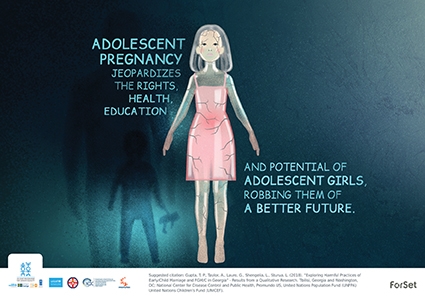From Evidence to Policy & Action: Harmful Practices of Early/Child Marriage
On April 19 the Conference “From Evidence to Policy and Action: Harmful Practices of Early/Child Marriage and FGM/C” wasjointly organized by the Inter-Agency Commission on Gender Equality, Violence against Women and Domestic Violence, the United Nations Population Fund (UNFPA) Georgia Country Office (within the frameworks of the UN Joint Program for Gender Equality, funded by Sweden) and the United Nations Children's Fund (UNICEF). The conference aims to present the findings of qualitative research on the harmful practices of Early/Child Marriage and Female Genital Mutilation (FGM). The research was undertaken in 2017 by the National Center for Disease Control and Public Health in cooperation with the international research organization - Promundo US with the support of United Nations Population Fund (UNFPA) and United Nations Children's Fund (UNICEF). The qualitative research explores local attitudes, beliefs, and practices of the phenomenon and examines risks and protective factors, root causes and consequences of the harmful practices of Early/Child Marriage and Female Genital Mutilation.Cutting (FGM/C) in Georgia.
According to the existing data, 14% of women aged 20-24 report having been in union before the age of 18 (2010). The information about FGM being practiced in one of the ethnic minority communities in Georgia was spread by media in 2016. Early/Child Marriage is a gendered phenomenon affecting boys and girls in a different way; it has major impact on the lives of girls in terms of limiting their opportunities and ability to participate fully in society and develop and reach their full potential.
Acknowledging the grave consequences of harmful practices, the qualitative research was carried to inform planning of the targeted policies and actions by the government, as well as raise awareness of society and trigger attitude change.
According to the findings of the qualitative research:
• Early/Child Marriage is common and frequent across the country, including in the capital, Tbilisi, as well as among communities with different ethnic and/or religious affiliation;
• Adolescent pregnancy jeopardizes the rights, health, education and potential of adolescent girls, robbing them of a better future;
• Girls in early/child marriage, unlike boys, are left with limited education, employment prospects and social networks;
• Existing strict norms consider pre-marital sexual relations unacceptable, therefore getting married is the only alternative for adolescents to avoid being stigmatized;
• Education and marriage are generally seen as two opposite ends of a continuum for girls in Early/Child marriage;
• In Early/Child marriage, responsibilities for women are rooted in nurturing and taking care of families. Decision-making around household finances, girls’ continued education, and family planning are often in the hands of husbands or the husband’s parents.
The conference aimed at disseminating the findings and recommendations of the qualitative research to shed light on the driving factors of Early/Child Marriage and FGM/C in Georgia, discuss attitudes towards the phenomenon and its consequences for adolescents/youth, families, communities and society. The evidence-based policy and operational recommendations will enable stakeholders to integrate targeted measures and actions for elimination of harmful practices into the relevant policies, strategies and national action plans, and to allocate resources to implement those, thus responding to the international Human Right commitments assumed and ensuring the sustainable development of the country.
The conference was attended by the Chairperson and members of the Inter-Agency Commission on Gender Equality, Violence against Women and Domestic Violence, the National Center for Disease Control and Public Health, Legislative and Executive government bodies, Public Defender’s office, UNFPA, UNICEF, representatives of civic society, and academia.












